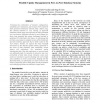Free Online Productivity Tools
i2Speak
i2Symbol
i2OCR
iTex2Img
iWeb2Print
iWeb2Shot
i2Type
iPdf2Split
iPdf2Merge
i2Bopomofo
i2Arabic
i2Style
i2Image
i2PDF
iLatex2Rtf
Sci2ools
130
click to vote
IDEAS
2005
IEEE
2005
IEEE
Flexible Update Management in Peer-to-Peer Database Systems
Promising the combination of dynamic configuration, scalability and redundancy, peer-to-peer (P2P) networks have garnered tremendous interest lately. Before long, this interest extended to P2P sharing of disparate databases. While many have explored the data placement and coordination difficulties involved in such systems, far fewer have examined the unique challenges involved in updating P2P-distributed data items. In addressing that problem, we present an adapted version of the traditional quorum-consensus approach that is better suited to the P2P domain. Further, we explore the many tradeoffs introduced by this flexible update scheme, especially in the areas of data freshness, data availability, access latency and redundancy. Our simulation results demonstrate that if the data replication or quorum levels are sufficiently high it is possible to achieve a near-zero probability of stale data access. However, since more nodes are involved in quorum-building, the cost of high data conf...
Related Content
| Added | 25 Jun 2010 |
| Updated | 25 Jun 2010 |
| Type | Conference |
| Year | 2005 |
| Where | IDEAS |
| Authors | David Del Vecchio, Sang Hyuk Son |
Comments (0)

